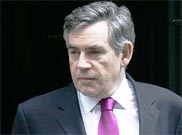EU approves rescue package as Brown inspires EU summit
 Brussels - The European Union approved its own financial rescue package at a summit that saw British Prime Minister Gordon Brown steal the limelight Wednesday in Brussels by proposing new rules for global capitalism.
Brussels - The European Union approved its own financial rescue package at a summit that saw British Prime Minister Gordon Brown steal the limelight Wednesday in Brussels by proposing new rules for global capitalism.
The 2-trillion-euro (2.7-trillion-dollar) package, initially approved by eurozone leaders at a Sunday meeting in Paris, includes measures to safeguard private savers, guarantee interbank lending and partly nationalize shaky financial insitutions.
It follows a similar initiative approved in the United States, where the global credit crunch originated.
"The whole of Europe, without exception, approves the plan agreed on Sunday," said French President Nicolas Sarkozy, whose country holds the rotating EU presidency.
The agreement in Brussels came after hours of discussions that saw member states such as the Czech Republic complain that it would allow for too much state intervention.
"The Czech government does seem to consider that the forces of the free market could arrange and reorient the turmoil we are going through in the right direction. I do not think so," said Luxembourg Prime Minister Jean-Claude Juncker, who chairs euro group meetings.
But the real surprise in Brussels came not from the Czechs but from Brown.
Despite his reputation as a eurosceptic, fellow EU leaders listened carefully to Britain's former chancellor of the exchequer as he outlined his plans for "a new Bretton Woods" that would avoid future financial panics.
The 1944 Bretton Woods conference laid out the foundations of post-World War II capitalism by establishing rules for the international monetary and financial order and by creating such bodies as the International Monetary Fund (IMF).
"Global financial markets present challenges that no one nation can solve in isolation," Brown said in a letter distributed to EU heads of state and government in Brussels.
"We must therefore strengthen global cooperation and build a new global financial architecture for the years ahead - a new Bretton Woods, which recognizes the globalization of financial risk in the responsibilities of global institutions."
Brown's four-point plan envisages "a global early warning system" to prevent future financial crises from spreading, "globally accepted standards of supervision and regulation," effective "cross-border supervision" of the world's 30 largest multinationals and "cooperation and concerted action" during times of crisis.
His proposals were expected to be discussed by a forthcoming Group of Eight summit extended to include emerging powers such as China and India.
Speaking on Tuesday, European Commission President Jose Manuel Barroso appealed to governments to put their divisions aside and sign up to the eurozone's plan.
"Even after this crisis, there are some governments that are opposing a more coordinated European approach," Barroso said. "To try and go it alone in this climate would be a fatal mistake for any government, anywhere in Europe."
In Paris, eurozone leaders also agreed to set up a financial crisis management unit tasked with sharing sensitive financial information among the eurozone's key players and to come up with a rapid, common response.
The unit would comprise governments, the EU presidency, the heads of the European Central Bank and of the European Commission, and the chairman of the euro group.
During their two-day summit in Brussels, EU leaders were also set to underline the need to "strengthen the supervision of the European financial sector," especially regarding banks and insurance companies operating in several member states.
With the rescue plan likely to dig deeply into member states' public accounts, EU leaders were set to agree on the need to relax the bloc's strict budgetary rules.
In a final statement due out Thursday, leaders were expected to affirm that the EU's revised Stability and Growth Pact should be applied in a manner that "reflects the current exceptional circumstances."
Officials in Brussels say this means that budget deficits would be allowed to exceed by "several decimal points" the standard limit of 3 per cent of gross domestic product.
Finally, EU leaders were set to call for a curb on managers' salaries. (dpa)